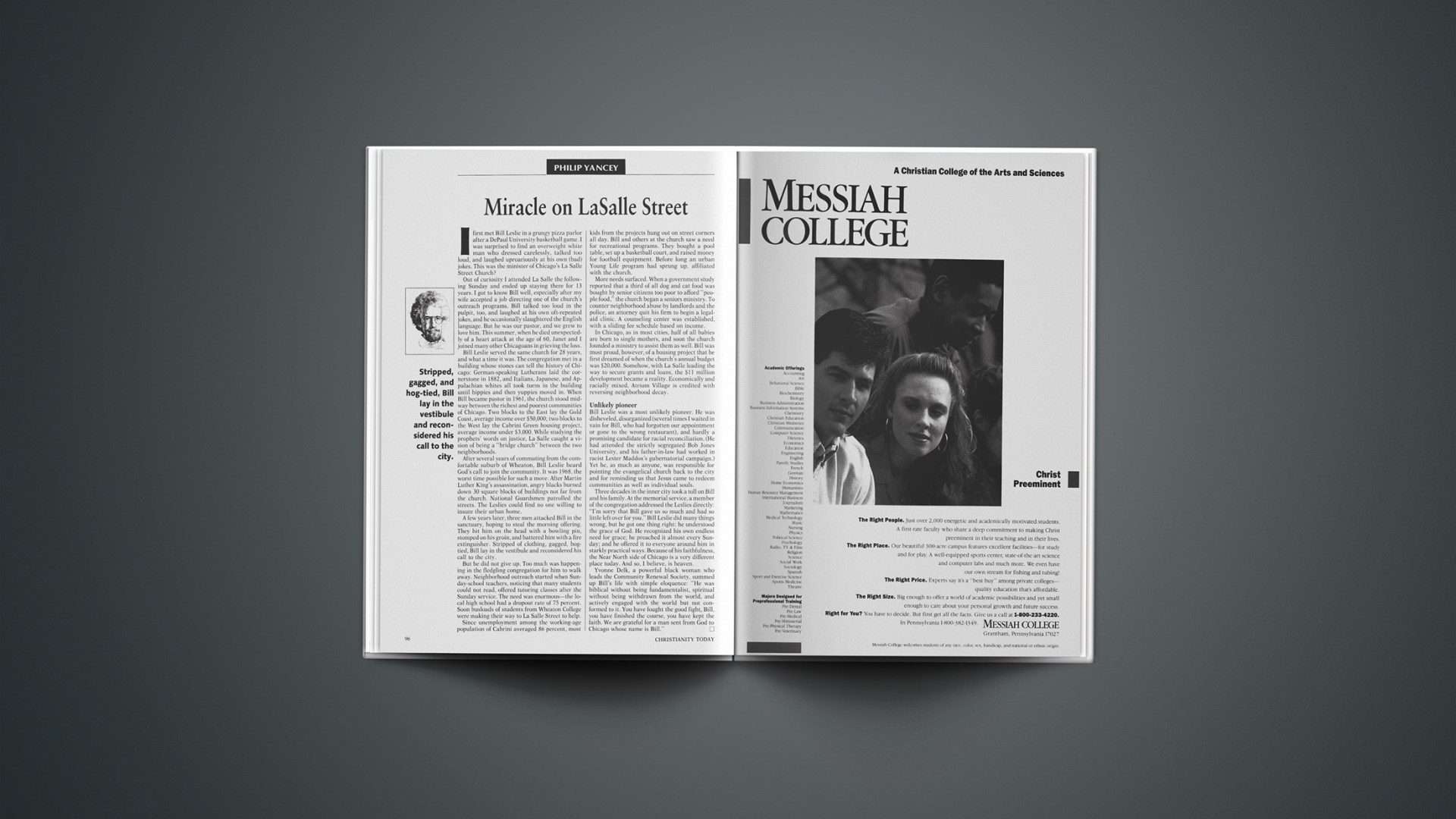I first met Bill Leslie in a grungy pizza parlor after a DePaul University basketball game. I was surprised to find an overweight white man who dressed carelessly, talked too loud, and laughed uproariously at his own (bad) jokes. This was the minister of Chicago’s La Salle Street Church?
Out of curiosity I attended La Salle the following Sunday and ended up staying there for 13 years. I got to know Bill well, especially after my wife accepted a job directing one of the church’s outreach programs. Bill talked too loud in the pulpit, too, and laughed at his own oft-repeated jokes, and he occasionally slaughtered the English language. But he was our pastor, and we grew to love him. This summer, when he died unexpectedly of a heart attack at the age of 60, Janet and I joined many other Chicagoans in grieving the loss.
Bill Leslie served the same church for 28 years, and what a time it was. The congregation met in a building whose stones can tell the history of Chicago: German-speaking Lutherans laid the cornerstone in 1882, and Italians, Japanese, and Appalachian whites all took turns in the building until hippies and then yuppies moved in. When Bill became pastor in 1961, the church stood midway between the richest and poorest communities of Chicago. Two blocks to the East lay the Gold Coast, average income over $50,000; two blocks to the West lay the Cabrini Green housing project, average income under $3,000. While studying the prophets’ words on justice, La Salle caught a vision of being a “bridge church” between the two neighborhoods.
After several years of commuting from the comfortable suburb of Wheaton, Bill Leslie heard God’s call to join the community. It was 1968, the worst time possible for such a move. After Martin Luther King’s assassination, angry blacks burned down 30 square blocks of buildings not far from the church. National Guardsmen patrolled the streets. The Leslies could find no one willing to insure their urban home.
A few years later, three men attacked Bill in the sanctuary, hoping to steal the morning offering. They hit him on the head with a bowling pin, stomped on his groin, and battered him with a fire extinguisher. Stripped of clothing, gagged, hogtied, Bill lay in the vestibule and reconsidered his call to the city.
But he did not give up. Too much was happening in the fledgling congregation for him to walk away. Neighborhood outreach started when Sunday-school teachers, noticing that many students could not read, offered tutoring classes after the Sunday service. The need was enormous—the local high school had a dropout rate of 75 percent. Soon busloads of students from Wheaton College were making their way to La Salle Street to help.
Since unemployment among the working-age population of Cabrini averaged 86 percent, most kids from the projects hung out on street corners all day. Bill and others at the church saw a need for recreational programs. They bought a pool table, set up a basketball court, and raised money for football equipment. Before long an urban Young Life program had sprung up, affiliated with the church.
More needs surfaced. When a government study reported that a third of all dog and cat food was bought by senior citizens too poor to afford “people food,” the church began a seniors ministry. To counter neighborhood abuse by landlords and the police, an attorney quit his firm to begin a legal-aid clinic. A counseling center was established, with a sliding fee schedule based on income.
In Chicago, as in most cities, half of all babies are born to single mothers, and soon the church founded a ministry to assist them as well. Bill was most proud, however, of a housing project that he first dreamed of when the church’s annual budget was $20,000. Somehow, with La Salle leading the way to secure grants and loans, the $11 million development became a reality. Economically and racially mixed, Atrium Village is credited with reversing neighborhood decay.
Unlikely pioneer
Bill Leslie was a most unlikely pioneer. He was disheveled, disorganized (several times I waited in vain for Bill, who had forgotten our appointment or gone to the wrong restaurant), and hardly a promising candidate for racial reconciliation. (He had attended the strictly segregated Bob Jones University, and his father-in-law had worked in racist Lester Maddox’s gubernatorial campaign.) Yet he, as much as anyone, was responsible for pointing the evangelical church back to the city and for reminding us that Jesus came to redeem communities as well as individual souls.
Three decades in the inner city took a toll on Bill and his family. At the memorial service, a member of the congregation addressed the Leslies directly: “I’m sorry that Bill gave us so much and had so little left over for you.” Bill Leslie did many things wrong, but he got one thing right: he understood the grace of God. He recognized his own endless need for grace; he preached it almost every Sunday; and he offered it to everyone around him in starkly practical ways. Because of his faithfulness, the Near North side of Chicago is a very different place today. And so, I believe, is heaven.
Yvonne Delk, a powerful black woman who leads the Community Renewal Society, summed up Bill’s life with simple eloquence: “He was biblical without being fundamentalist, spiritual without being withdrawn from the world, and actively engaged with the world but not conformed to it. You have fought the good fight, Bill, you have finished the course, you have kept the faith. We are grateful for a man sent from God to Chicago whose name is Bill.”
Loren Wilkinson is the writer/editor of Earthkeeping in the ’90s (Eerdmans) and the coauthor, with his wife, Mary Ruth Wilkinson, of Caring for Creation in Your Own Backyard (Servant). He teaches at Regent College in Vancouver, British Columbia, Canada.










